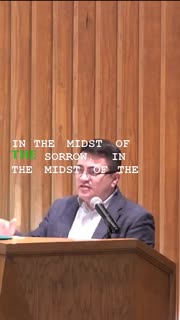Hope and Joy in the Resurrection Feast
Devotional
Sermon Summary
Bible Study Guide
Sermon Clips
1. "And it's in that hope that we anchor our faith in the promises of Jesus Christ. Today, I'm not a reporter to you. I don't have any slides on the screen. So I would like your attention to just look at this, maybe this foot right here. You know, I'm pretty short. So I would like to share with you some good news and some bad news. Which one do you want first? We all would disagree, right? It depends where we are. You know, we had a horrible week. Give me some good news. And if we had a good week, you know what? Give me the bad news. So we might all disagree." [33:41] (39 seconds)
2. "We believe that the whole Bible is inspired by God. To edify the church. To build up the church. To correct us. And to lead us. And to guide us. The Old Testament is there for a reason. It has a purpose. So Isaiah is talking to the people. And he's proclaiming to them what will take place. And does anyone know what's going to take place? Judgment. And how many of you are so hungry for judgment? You smile because no one is hungry for that." [40:01] (37 seconds)
3. "Judgment is not well received. But when we read Isaiah, those are words to tell us who we are to. Because we are not different than the people from Babylon. The people from Moab. And there was one thing. In our Bible study, we have one thing that continued to carry over. It was pride. And don't say, pastor, I'm not proudful. Well, that's proudful. Just saying that is proudful. So we do have this sense. It's the inclination to be proudful. So Isaiah talks to the people and to us. And that's a privilege that we have. That's a privilege that we get to hear God himself." [41:14] (49 seconds)
4. "What a privilege to know that our God, our God is sharing with us everything that he's thinking of. Every detail. Even to a point of what he's cooking for you. The God, the creator, cooks for you. So as we read these passages from Isaiah, there is one thing that is for certain. That God will carry out what he promised he will do. He has done it. He's doing it. And he will do it. Until the day of completion." [42:59] (39 seconds)
5. "In the middle of sorrow here, there is edification and joy over there. And isn't that how our lives are sometimes? In the middle of our sorrow, there's a little glimpse of joy, a little glimpse of hope in our lives. See, God is preparing a feast for you and for me. In the midst of all the sorrows you go through, he's preparing something delicious. Something so unique. That you cannot even imagine the fragrance." [50:21] (36 seconds)
6. "In the midst of the sorrow, in the midst of the judgment, he says, look what I'm making. I'm selecting things. I'm picking everything precisely just for you. And he does this in a personal way when he says, and I will wipe away every tear from you. Isn't that beautiful? How many tears? Have you counted your tears lately? It's hard to count, but he knows your tears. He will wipe away every tear." [52:36] (30 seconds)
7. "In the midst of sorrow, God's saying, wait a minute. That right there, it was really a blow off. That you did. You blow it off. But in here, I am the chef. And this is not hell's kitchen. This is heaven's kitchen. And in this kitchen, he is the cook. I mean, you can select me according to what your options are. But think about the options that God has. Think about all the diverse meats that he knows that we have not tasted. Think about the spices. The spices that we have not tasted." [54:15] (47 seconds)
8. "God is cooking for you. And he's taken 2,000 years to prepare that feast for us. What kind of banquet is this that he's preparing for us? You see, even though we taste our food, and we know if it needs something, this is the beauty about this chef. Chef Jesus. Naturally, Jesus. He already had tasted the food for us. And not just any food. It was the food that killed us. He tasted death for us. What got us in trouble in the first place? He himself took it upon himself." [55:57] (49 seconds)
9. "In the midst of sorrow, there is pain. In the midst of pain, there is hope. And there is joy. It's not like claiming and naming and it's all fine. Jesus says in this life you will have many, many, many, many sorrows. He himself went through those sorrows for you and me. So that our sorrows will be temporary. That our sorrows will look temporary. Minimal compared to eternity. And this is the feast of hope. The victory of God. We thank Jesus for this." [58:50] (48 seconds)
Ask a question about this sermon
2. "We believe that the whole Bible is inspired by God. To edify the church. To build up the church. To correct us. And to lead us. And to guide us. The Old Testament is there for a reason. It has a purpose. So Isaiah is talking to the people. And he's proclaiming to them what will take place. And does anyone know what's going to take place? Judgment. And how many of you are so hungry for judgment? You smile because no one is hungry for that." [40:01] (37 seconds)
3. "Judgment is not well received. But when we read Isaiah, those are words to tell us who we are to. Because we are not different than the people from Babylon. The people from Moab. And there was one thing. In our Bible study, we have one thing that continued to carry over. It was pride. And don't say, pastor, I'm not proudful. Well, that's proudful. Just saying that is proudful. So we do have this sense. It's the inclination to be proudful. So Isaiah talks to the people and to us. And that's a privilege that we have. That's a privilege that we get to hear God himself." [41:14] (49 seconds)
4. "What a privilege to know that our God, our God is sharing with us everything that he's thinking of. Every detail. Even to a point of what he's cooking for you. The God, the creator, cooks for you. So as we read these passages from Isaiah, there is one thing that is for certain. That God will carry out what he promised he will do. He has done it. He's doing it. And he will do it. Until the day of completion." [42:59] (39 seconds)
5. "In the middle of sorrow here, there is edification and joy over there. And isn't that how our lives are sometimes? In the middle of our sorrow, there's a little glimpse of joy, a little glimpse of hope in our lives. See, God is preparing a feast for you and for me. In the midst of all the sorrows you go through, he's preparing something delicious. Something so unique. That you cannot even imagine the fragrance." [50:21] (36 seconds)
6. "In the midst of the sorrow, in the midst of the judgment, he says, look what I'm making. I'm selecting things. I'm picking everything precisely just for you. And he does this in a personal way when he says, and I will wipe away every tear from you. Isn't that beautiful? How many tears? Have you counted your tears lately? It's hard to count, but he knows your tears. He will wipe away every tear." [52:36] (30 seconds)
7. "In the midst of sorrow, God's saying, wait a minute. That right there, it was really a blow off. That you did. You blow it off. But in here, I am the chef. And this is not hell's kitchen. This is heaven's kitchen. And in this kitchen, he is the cook. I mean, you can select me according to what your options are. But think about the options that God has. Think about all the diverse meats that he knows that we have not tasted. Think about the spices. The spices that we have not tasted." [54:15] (47 seconds)
8. "God is cooking for you. And he's taken 2,000 years to prepare that feast for us. What kind of banquet is this that he's preparing for us? You see, even though we taste our food, and we know if it needs something, this is the beauty about this chef. Chef Jesus. Naturally, Jesus. He already had tasted the food for us. And not just any food. It was the food that killed us. He tasted death for us. What got us in trouble in the first place? He himself took it upon himself." [55:57] (49 seconds)
9. "In the midst of sorrow, there is pain. In the midst of pain, there is hope. And there is joy. It's not like claiming and naming and it's all fine. Jesus says in this life you will have many, many, many, many sorrows. He himself went through those sorrows for you and me. So that our sorrows will be temporary. That our sorrows will look temporary. Minimal compared to eternity. And this is the feast of hope. The victory of God. We thank Jesus for this." [58:50] (48 seconds)









